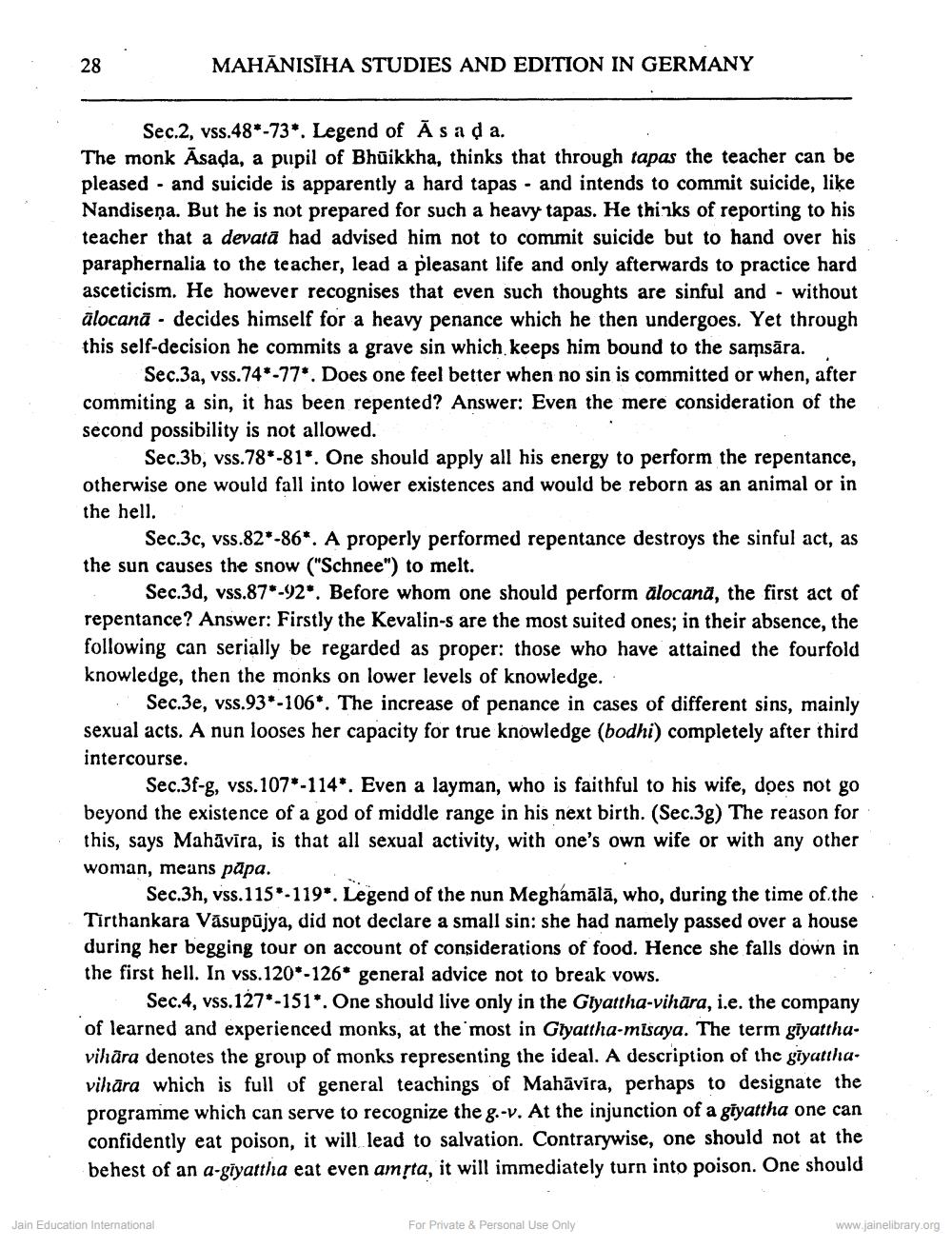________________
28
MAHĀNISĪHA STUDIES AND EDITION IN GERMANY
Sec.2, vss.48*-73*. Legend of Ăs ad a. The monk Āsada, a pupil of Bhūikkha, thinks that through tapas the teacher can be pleased - and suicide is apparently a hard tapas - and intends to commit suicide, like Nandiseņa. But he is not prepared for such a heavy tapas. He thinks of reporting to his teacher that a devatā had advised him not to commit suicide but to hand over his paraphernalia to the teacher, lead a pleasant life and only afterwards to practice hard asceticism. He however recognises that even such thoughts are sinful and - without alocană - decides himself for a heavy penance which he then undergoes. Yet through this self-decision he commits a grave sin which keeps him bound to the samsāra.
Sec.3a, vss.74*-77*. Does one feel better when no sin is committed or when, after commiting a sin, it has been repented? Answer: Even the mere consideration of the second possibility is not allowed.
Sec.3b, vss.78*-81*. One should apply all his energy to perform the repentance, otherwise one would fall into lower existences and would be reborn as an animal or in the hell.
Sec.3c, vss.82*-86*. A properly performed repentance destroys the sinful act, as the sun causes the snow ("Schnee") to melt.
Sec.3d, vss.87*-92*. Before whom one should perform alocană, the first act of repentance? Answer: Firstly the Kevalin-s are the most suited ones; in their absence, the following can serially be regarded as proper: those who have attained the fourfold knowledge, then the monks on lower levels of knowledge.
Sec.3e, vss.93*-106*. The increase of penance in cases of different sins, mainly sexual acts. A nun looses her capacity for true knowledge (bodhi) completely after third intercourse.
Sec.3f-g, vss. 107*-114*. Even a layman, who is faithful to his wife, does not go beyond the existence of a god of middle range in his next birth. (Sec.3g) The reason for this, says Mahāvīra, is that all sexual activity, with one's own wife or with any other woman, means pāpa.
Sec.3h, vss.115-119*. Legend of the nun Meghamālā, who, during the time of the Tirthankara Vasupujya, did not declare a small sin: she had namely passed over a house during her begging tour on account of considerations of food. Hence she falls down in the first hell. In vss. 120*-126* general advice not to break vows.
Sec.4, vss. 127*-151". One should live only in the Glyattha-vihāra, i.e. the company of learned and experienced monks, at the most in Giyattha-misaya. The term giyattha. vihāra denotes the group of monks representing the ideal. A description of the giyatthavihāra which is full of general teachings of Mahāvīra, perhaps to designate the programme which can serve to recognize the g.-v. At the injunction of a giyattha one can confidently eat poison, it will lead to salvation. Contrarywise, one should not at the behest of an a-giyattha eat even amsta, it will immediately turn into poison. One should
Jain Education International
For Private & Personal Use Only
www.jainelibrary.org




